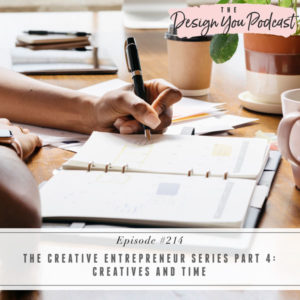
The two most important things I’ve ever done to change my life and create success in my business was to learn to manage my thoughts and manage myself with time. So this week, in the final part of The Creative Entrepreneur Series, it’s time to tackle time.
Of all the things that hold us creative entrepreneurs back in our businesses, our thoughts about time and our calendars or schedules is one of our biggest obstacles. So many of us believe that if we just had more time in the day, we could complete exactly what we want to do. But time is not the real enemy of creativity. So what is?
In this episode, I’m showing you why your thoughts and beliefs around time and schedules aren’t helpful or serving you. Discover the real reason the time management tools you’ve been using up to now aren’t working, and how changing the way you think about your relationship with time will enable you to create more success than ever in your business.





